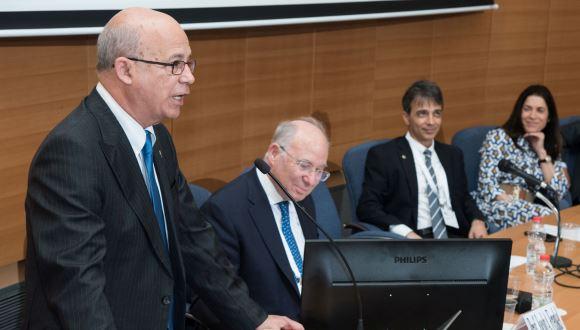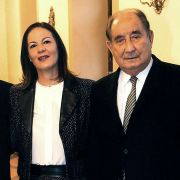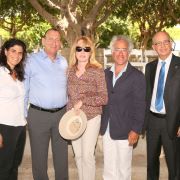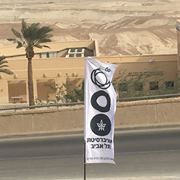BOG 2017: Report by Prof. Joseph Klafter
Dear Governors,
I would like to open with three interesting facts:
- At the beginning of May, the State of Israel conferred its highest honor – the Israel Prize – on 8 recipients. Half of them were professors at Tel Aviv University.
- In Europe, we rank 6th among almost 200 leading universities – and 1st in Israel – in its mega research funding program.
- For the 3rd year running, TAU has ranked among the top 10 schools in the world for alumni who founded VC-backed startups. We’re the only Israeli institution and in fact the only non-American one to make this cut.
I wish to create a bit of context for that last achievement. In the startup ranking, Tel Aviv University places just below the University of Michigan. Michigan is 200 years old. We’re 61 years young. Michigan has 3 campuses and 45,000 students; TAU has 1 campus and 30,000 students. Michigan has annual operating costs of $7 billion; TAU’s are half a billion. Clearly Tel Aviv University cannot compare with the University of Michigan in age, size or wealth. Yet there we are, side by side, in the global ranking for entrepreneurial graduates alongside Stanford, MIT and Cornell.
So, how is it that a young, modestly-funded public university dominates the local and international academic arenas? How do we do it? I think it’s a matter of priorities. Yes, we offer a world-class education; yes, we impart vital career and life skills. Both are crucially important. But more than that, or perhaps underlying that, Tel Aviv University is in the business of ideas. Ideas in all fields.
Like any business that wants to stay competitive, we need to continually rethink and refresh our methods. We need to ask ourselves, on a continual basis: What’s a good idea? What do we do with it? And how do we generate more?
First: What’s a good idea? Can you write an algorithm for recognizing it? Analyze it psychologically? Model it economically? Albert Einstein famously said, "If at first, the idea is not absurd, then there is no hope for it."
For years, I’ve said in talks around the world that Tel Aviv University encourages bold and even crazy ideas. It’s part of our culture. For example, take 3D printing, which for most of us is associated with paper models or plastic prototypes. For Dr. Tal Dvir, he sees it as the future of medicine. We inaugurated the Sagol Center for Smart Biotechnologies, where Dr. Dvir and his team are developing a way to print human tissue to repair damaged hearts. Imagine a future where we could print entire organs like hearts or livers or skin for burn victims. Earlier this year, we launched the Morris Kahn 3D Printing for Cancer Research Initiative in the lab of Prof. Ronit Satchi-Fainaru. Her idea is to print live cancer tumors. This will be a huge breakthrough. Scientists will be able to finally see, in three dimensions and in real time, how cancer functions in the body. They’ll be able to test and personalize treatment much more quickly.
But why stop at medicine? What if we could print self-repairing metal parts for sensors or robots? TAU has also recently established the Center for 3D Printing, headed by Prof. Noam Eliaz of Engineering in collaboration with scientists in the US and Australia. The Israeli Ministry of Defense is providing initial funding, and Noam is currently in talks with NASA.
I’ll tell you about another idea initiated by the Dean of Students, Prof. Tova Most. It’s to make social innovation and volunteerism a required part of the curriculum, as self-evident as English or statistics. The idea is to send a strong message to our students about what it means to be a contributing member of society. Of course the University went for it. As of this year, TAU introduced 35 courses in civic leadership – fully accredited courses taught in cooperation with local NGOs. Next year we’ll offer 60.
I spoke about recognizing a good idea when it hits you. Now I want to discuss what we DO with good ideas. The University has kicked off a number of exciting projects this year to transform ideas into real-world applications, products and companies. I’ll share with you a sampling:
- We’ve set up a hub for startup development by students, alumni and beyond, called TAU Ventures. We're inaugurating the physical space for this ambitious framework: The Miles S. Nadal Home for Technological Innovation and Entrepreneurship.
- We raised $20 million for an IoT investment fund – the first of its kind in Israel. It’s managed by TAU Ventures in partnership with General Electric, Microsoft, Tata, Pitango and others. The IoT market is predicted to reach $270 billion by 2020!
- We’re establishing a Center for Translational Biomedicine. Did you know that a quarter of all FDA-approved drugs resulted from scientific research conducted by Israelis? At Tel Aviv University, we’re making some amazing discoveries in the biomed field – but we haven’t managed to turn enough of them into drug candidates. Our plan is to work closely with TAU’s affiliated hospitals on drug trials and testing.
And finally – the billion dollar question – how do we generate more good ideas? I say “billion dollars” because our Tel Aviv University Capital Campaign has a fundraising goal of $1 billion. For example, what can we contribute to the rapidly evolving world of new media? We’re inaugurating this afternoon the Dan Department of Communication that will redraw the boundaries of the field. In another example, how can we motivate business students to Think Big? On Tuesday, we held the first Coller $1 Million Startup Competition. Jeremy Coller, a TAU Honorary Doctor, challenged students to come up with the next life-altering idea that could attract venture capital. How do you get engineers to think outside the box? High tech companies are hungry for this, and Israel needs it to stay economically competitive in the long run. We introduced this academic year the Mandel Program for the Humanities in Engineering – part of a larger bid to centralize the role of the Humanities and open new horizons for thinking and imagining. What will teaching and learning look like in the future? Minducate, a new interdisciplinary research program, is bridging between neuroscience and the learning process and could place Israel on the world map for new educational technologies. Right after this session we’re holding a symposium on cognitive science and learning that I think you’ll find fascinating.
I’ve described to you some of the ways we’re enhancing our idea business, but like any viable business we also need human and material resources to grow and thrive. Our University Governors and Friends have been fantastic partners in this effort.
First, we have had the good fortune to receive infusions of funding from existing supporters – we see this as a supreme vote of confidence. We’re seeing major expansion at the Sagol School of Neuroscience; an upgrading of the Strauss Center for Computational Neuroimaging; a new prize at the Boris Mints Institute for Strategic Policy Solutions to Global Challenges; the new Goldstein-Goren Center for Mind, Cognition and Language established by second-generation supporters; and a further drive to globalize the Zvi Meitar Center for Legal Studies, the vision of the Meitar family. Ms. Dafna Meitar-Nechmad, our TAU Campaign Co-Chair, TAU alumna and also a second generation donor, will be addressing you this morning.
Second, we’re thrilled about all the construction going on – not since Herod the Great have we seen such a building spree:
- During the Board we’re inaugurating a number of special care facilities at the Dental School, the gifts of French and American donors.
- We cut the ribbon a few months ago for the Porter Dead Sea Research Institute for Life under Extreme Conditions, supported by Dame Shirley Porter and the Porter Foundation. This facility stands at the base of Masada, and provides labs and office space for the interdisciplinary study of the Dead Sea’s remarkable environment.
- We’re holding our Board of Governors party at the Steinhardt Museum of Natural History on Saturday night; the official Museum opening is in June. On Friday morning we’ll unveil the Museum’s Fabian-Cyril Boisson Auditorium donated by Nathalie Kerber.
- The Check Point Building is rapidly gaining shape – we’ve already named the lobby and 2nd floor in honor of major donors to the project.
- We broke ground for the Lorry I. Lokey Graduate Center at the Coller School of Management. The local and international business community is rallying to the cause of advanced business studies by supporting a number of lecture halls and other units in the building.
- We also broke ground for the Pouran and Izak Parviz Nazarian Building.
- We’ll soon begin construction on the Nano Building, and have begun to fundraise for the subunits inside it.
- We’re in the design and planning stage for a Life Sciences Building that will add much needed teaching space. This will be especially helpful to the faculty after the recent launch of the Argentina Fund for the Direct PhD Program in Life Sciences.
- The new Buchmann Building will provide a beautiful new entrance to the law school as well as teaching and meeting space. The Edmond J. Safra Foundation will be supporting the Safra Floor there.
- Our Student City housing complex is so successful that we’re adding 3 more towers on the Eastern side, right opposite Engineering.
- The ink is still fresh for the Azrieli School of Architecture Building, yet another project initiated by second-generation donors. The cornerstone-laying ceremony will be held in the presence of the Premier of Quebec, Philippe Couillard, who will also be receiving the Tel Aviv University President’s Award for promoting Israel-Canada academic ties.
- And last but not least, we will be launching the Sylvan Adams Sports Institute – which will be the most advanced sports research, testing and training facility in Israel. Sylvan, a prize-winning cyclist, is a second generation TAU donor and a new immigrant from Canada.
.jpg)
Josef Buchmann Entrance Building
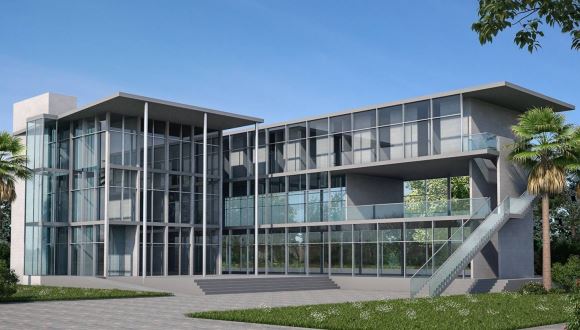
Architect's rendering of the Sylvan Adams Sports Institute
We can’t talk seriously about the future without discussing a number of challenges. First, we must keep up the momentum of hiring new faculty and attracting post-docs, especially from abroad. Both are costly but they pay off in many ways – they feed our research enterprise, they internationalize the campus, and they bring in grant funding. For example, our younger faculty members have brought in more ERC starting grants than any other institution in Europe save two. To give you a sense of how much money is involved, the University is currently managing $200 million in European funding for both junior and senior faculty.
Another area we must work on is gender equality. Our overall track record is good – 55% of students are women. But in STEM fields, women students and faculty are still underrepresented. We’re putting in motion a number of programs – ranging from STEM enrichment for schoolgirls to post-doc fellowships for women scientists – but we will need help and funding to make any real impact.
Another area we’d like to develop is TAU International. Enrolment in our English-language degree programs dipped this year after years of steady growth, and one of the reasons is that we’re not providing enough scholarships. Here, again, donations can help us diversify and expand the student body. One area where we have made a dent is in East Asia. We’re seeing a growing number of PhD and post-doc candidates on campus from India and China – and they are a fantastic addition.
Indeed, this Board of Governors meeting is being held under the banner of “Global TAU” and from my point of view it could be “Asian TAU.” We launched this year the China Israel Innovation Forum in Beijing, and held our 9th India-Israel Forum in Mumbai. Tonight, at the honorary degrees ceremony, we’ll celebrate our global reach as East meets West.
Your presence here – Governors, friends and supporters from all corners of the world – reinforces our global sense of community and shared purpose. I’d like to take this opportunity to thank you for enormous commitment and hard work on the University’s behalf – our Friends and Campaign leadership; the Tel Aviv University management, the faculty and administrative staff, and my own personal staff. Thank you for your dedication and partnership as we advance the University ever forward together.


